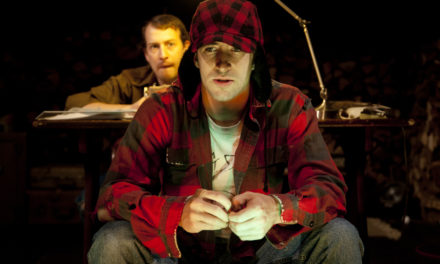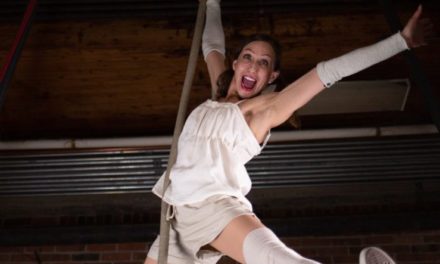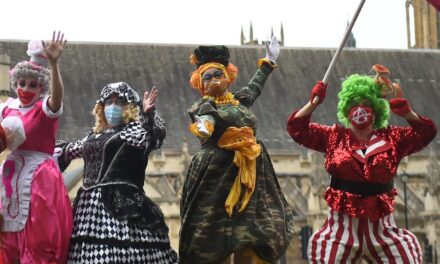First published in 1943 in New York, the story of the little prince and his travels hasn’t lost its relevance and popularity. Its message of love, responsibility, and loss bears just as much meaning in the 21stcentury as it did 75 years ago. Translated into 300 languages, this timeless tale has touched over 400 million readers’ hearts and inspired numerous adaptions, films, and plays.
In a lively and poignant stage adaption presented by Xameleon Theatre, director Ovlyakuli Khodzhakuli retells the myth of the little boy traveling from planet to planet in the pursuit of friendship and happiness.
Cardboard, brown paper, and soap bubbles–Khodzhakuli’s stage set-up’s a minimalist rendition of the harsh and sharp surfaces of foreign planets. Upon entering the stage at London’s cockpit theatre, members of the audience are invited to come up with their own interpretation of the props visible on stage: a parachute, a metal composite combining a bicycle and a floor lamp, and another requisite resembling a clay oven. “Dear English speakers,’ we hear from the loudspeakers, “please ensure that you have a good view at the subtitles above the stage.”
A fair warning, as the play is performed in Russian. The auditorium’s almost full, children sitting in the three front rows that surround the stage, their parents just behind with friends and family. Saint-Exupery’s book truly speaks to people of all ages, inviting children and adults alike to question what they see and to become more aware of things they can’t see.
The lights go out, the music starts, and three figures appear on stage, the brown paper beneath their bare feet crunching. The musical background echoes the minimalist set-up of the stage, with the violin and the piano alternating to provide a mysterious atmosphere.

Little Prince by Xameleon Theatre productions in London
Most people will recognize the story’s basics: a pilot crashes in the middle of the desert; his odds of survival are grim. Out of nowhere appears a little boy, a prince, who’s traveled to Earth from his own solitary asteroid. He’s fallen out with his only companion, a rather flickish rose, so he decides to leave and find friends elsewhere in the universe. On his travels he meets the strangest characters, a king with no subjects to reign over, a drunkard imprisoned in a vicious circle of shame and drink, a businessman who spends his days counting the stars which he claims for himself, a conceited man in constant need of affirmation, a lamplighter suffering under the yoke of unquestioned loyalty, and a geographer who’s never stepped out of his office to explore the world he writes about.
Belarusian actor Oleg Sidorchik wonderfully depicts the aviator’s desperation, exhaustion, and wonder about this little person interfering with his attempts to fix his plane. He’s annoyed and angry, shouting at his strange companion in miscomprehension. Their hierarchy of needs isn’t aligned. The pilot wants water, the Little Prince a drawing of a sheep. The pilot worries about his plane, the little boy about a rose far away on another planet. It’s this tension between our immediate physical needs and our emotional wellbeing and desires as human beings that Saint-Exupery puts into direct contrast. Himself once stranded in the Saharan desert whilst serving as a pilot in WWII, the author wrote the story of the Little Prince in New York exile. Far away from his homeland France and worrying about his loved ones still living in this horrible war, he tries to find answers to fundamental questions in his story: How can someone disappear from your life, but still live on in your heart? How can we live with tremendous loss?

Little Prince by Xameleon Theatre productions in London
It’s the fox the Little Prince meets on Earth who teaches him that what we gain from giving and receiving love weighs more than the loss we may experience. It’s a message of hope, hope that our loved ones live on in our memories. The Little Prince parts from his pilot knowing that he’ll never look at the stars in indifference again. On one of those bright dots in the sky, lives a little boy with his rose. A message of hope.
All the while, the essence of Antoine de Saint-Exupery’s oeuvre remains invisible to the eye. Rather than intentionally educating with sermons and clear moral statements, the author leaves us puzzled and challenges us to find our very own meaning. By creating a play that’s just as accessible and appealing to children as it is to adults, Khodzhakuli reproduces this open approach; deliberately abstract we are prompted to find our own answers. Xameleon’s production truly reflects this universal tale’s appeal. No matter how old you are or what language you speak, The Little Prince always finds its way into your heart.
This article first appeared in Ceel on October 23, 2018, and has been reposted with permission.
This post was written by the author in their personal capacity.The opinions expressed in this article are the author’s own and do not reflect the view of The Theatre Times, their staff or collaborators.
This post was written by Juno Schwarz.
The views expressed here belong to the author and do not necessarily reflect our views and opinions.


















